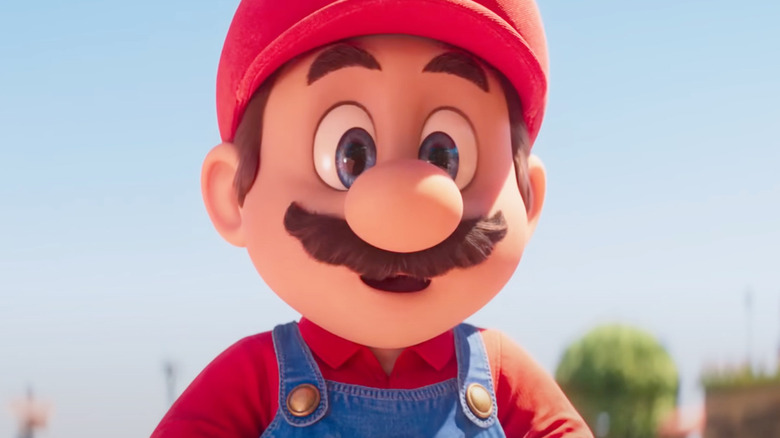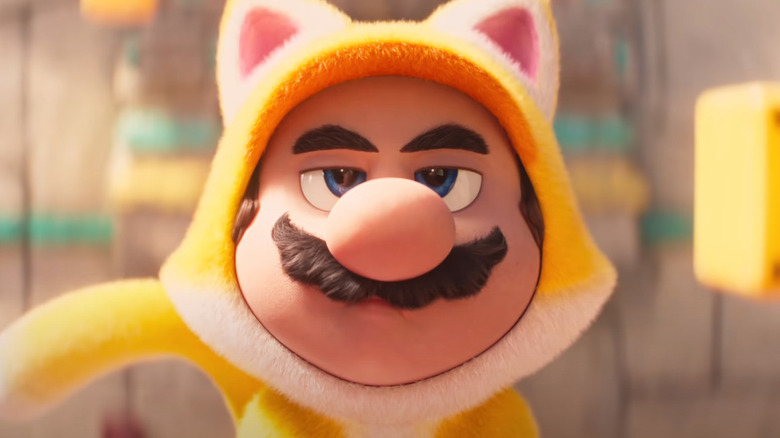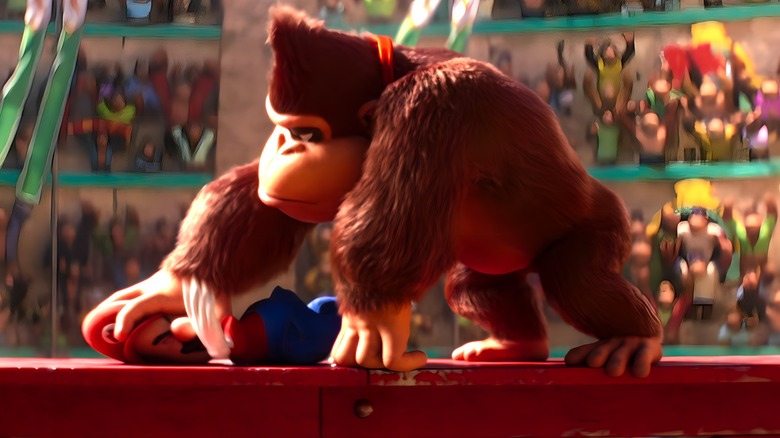The Super Mario Bros. Movie's Song Choices Had Fans Groaning In Their Seats
Above all else, "The Super Mario Bros. Movie" is a love letter to the iconic game franchise it's based on. All the familiar elements are there — Mario bravely platforming to save the day, Bowser seeking dominance over the Mushroom Kingdom, Luigi being a perfect mix of a cowardly and capable hero, and so on. There's even a ton of "Mario"-related easter eggs that only devoted fans of the series will appreciate. Of course, the film also introduces a lot of new things to the "Mario" universe, both narratively and stylistically, and one of those additions in particular is proving divisive among fans. Four words: licensed '80s pop songs.
Dotted amid the film's sweeping renditions of classic "Mario" tunes are such crowd-pleasers as "Holding Out for a Hero" by Bonnie Tyler and "Mr. Blue Sky" by Electric Light Orchestra. These songs may be staples of the pop genre, but their usage in "The Super Mario Bros. Movie" has nonetheless become a point of derision among viewers. "I need Illumination and, frankly, all Hollywood animation execs to PLEASE stop forcing in licensed pop songs just because you can," @strongest_human tweeted. Others shared similar sentiments, with Mega64 member Rocco Botte writing: "Mario movie was fine, but to me, the goofy contemporary music cues sell the material short. They would never blast 'Thunderstruck' over the opening of a Harry Potter movie. But when it happens in 'Mario,' it just again feels like another case of 'well yeah video games are stupid.'"
Fans think the licensed music rarely fits
Many fans aren't happy with "The Super Mario Bros. Movie's" inclusion of licensed pop songs, but some have particularly criticized the songs for not being good tonal fits for their respective scenes. In one discussion thread, u/holydiiver singled out a-ha's one-hit wonder "Take On Me" as a particularly awkward choice for the sequence in which Mario and company visit Donkey Kong's home, given how the song's sheen contrasts with the Jungle Kingdom's rougher vibe. Commenters not only agreed with this assessment, but went on to describe the strange placements of licensed music in "The Super Mario Bros." movie as a pervasive issue on the whole. Similarly, u/RandoStonian argued that none of the film's licensed tracks line up well with the scenes that incorporate them, offering up Disney's "Cruella" as an example of a film that accomplished such a task.
Some fans have even developed theories for why the pop songs were included in "The Super Mario Bros. Movie" in the first place. In an attempt to explain this controversial aspect, u/Jeskid14 suggested that Universal Pictures required Illumination to incorporate licensed music for marketing purposes. If that idea did prove true, it would mean the studio only included pop songs due to a mandate from higher-ups, and not necessarily for artistically fulfilling reasons. Of course, that's all pure speculation at the moment, and there's yet another element to the whole story that partially de-confirms this theory.
Some original tracks got beat out by licensed songs
Some fans of "The Super Mario Bros. Movie" are frustrated by the pop songs for another reason. There's concrete evidence that some original "Mario"-centric tracks created specifically for the movie were omitted in favor of licensed songs in the final cut. As one example, the official soundtrack release includes a track titled "Drivin' Me Bananas." Based on its sequential placement in the track listing and its use of "Donkey Kong Country" motifs, it's clear that this song was originally intended to be used during the movie's Jungle Kingdom portion. However, it's nowhere to be heard in the actual film, with "Take On Me" playing instead. "It made NO SENSE why they started playing that song when they were being ushered to Cranky Kong," @DraGoon1988 tweeted. "This would have been 100x better."
Importantly, longtime "Mario" composer Shigeru Miyamoto has confirmed that these licensed songs did not necessarily replace their original score counterparts. In an interview with Rolling Stone, the creative revealed why the team used licensed songs, explaining that they originally added many of these licensed tracks as placeholders before creating the new compositions. "[We] then went in and tried to replace them with songs that were created specifically for the movie," he recalled. "But there were still scenes where we felt like the licensed songs worked better, and those are what's left in. Another thing that we thought about was [that] all of the music created for the movie — that includes Nintendo music — none of it has lyrics and vocals, and having a movie score that doesn't have any lyrics and vocals might be a little off, so we thought it'd be good to have. We've kind of leaned on the licensed music to provide vocal lyrical relief in the musical score."


